Brexit: PM suggests backstop will not be removed from deal
- Published
- comments
Theresa May: My commitment to no hard border in NI is "unshakeable"
Theresa May has said she wants changes to the controversial backstop but suggested she is not seeking to remove it from her Brexit deal.
In a speech in Belfast, the prime minister restated her "unshakeable" commitment to avoiding a hard border after Brexit.
Mrs May said the backstop's "potential indefinite nature" was the issue.
However, Downing Street said the government was still considering alternatives.
The backstop is an insurance policy designed to avoid a hard border "under all circumstances" between Northern Ireland and the Irish Republic after Brexit.

Backstop of some sort
Analysis by John Campbell, BBC News NI Business Editor
For some Brexit supporters in Mrs May's party the message is simple - bin the backstop.
But in answers to questions after her Belfast speech, she seemed clear that a withdrawal deal will need a backstop of some sort.
She said: "There is no suggestion that we are not going to ensure in the future there is provision for this insurance policy... the backstop.
"What parliament has said... is that they want to see changes to the backstop as it currently exists within the protocol, as part of the withdrawal agreement."
That may put her at odds with members of her own party who want radical change to the backstop.

Addressing an audience of business leaders in Belfast on Tuesday, Mrs May said she was "grateful" to firms and farming groups who supported the backstop in the withdrawal agreement.
Ultimately, that deal was rejected by Parliament, and the prime minister has now moved to ask the EU to re-open the withdrawal agreement and allow legally-binding changes to be made to the backstop.
Mrs May is due to meet the European Commission President Jean-Claude Juncker for talks in Brussels on Thursday.
The Irish Prime Minister Leo Varadkar is to visit on Wednesday.
Allow X content?
This article contains content provided by X. We ask for your permission before anything is loaded, as they may be using cookies and other technologies. You may want to read X’s cookie policy, external and privacy policy, external before accepting. To view this content choose ‘accept and continue’.
The Democratic Unionist Party and Brexiteers believe the backstop could threaten the integrity of the union and could leave the UK stuck with EU rules if a trade deal is not agreed.
Earlier on Tuesday, DUP leader Arlene Foster said the "toxic backstop" remained the problem.
The Republic of Ireland and EU have said there can be no renegotiation of the Brexit deal, or the backstop, leading to a rift in relations between the UK and the Irish government.
On Tuesday, Mrs May said she wanted to strengthen the UK's "unique" relationship with the Irish government - including the "tantalising possibility" of a joint UK-Irish bid for the football World Cup in 2030.
The EU must be realistic if the Irish border issue is to be resolved, says Arlene Foster
In a gesture towards nationalist concerns, the prime minister said she had asked the home secretary to review cases concerning Irish citizens in Northern Ireland who have had difficulties bringing in family members.
However, Sinn Féin's Michelle O'Neill said Mrs May's visit came after she had "performed a major U-turn" over the backstop, an action she described as "an enormous act of bad faith".
"I heard nothing (from the prime minister) that would leave the community here to be in any way feeling in a better position than before her visit," she added.
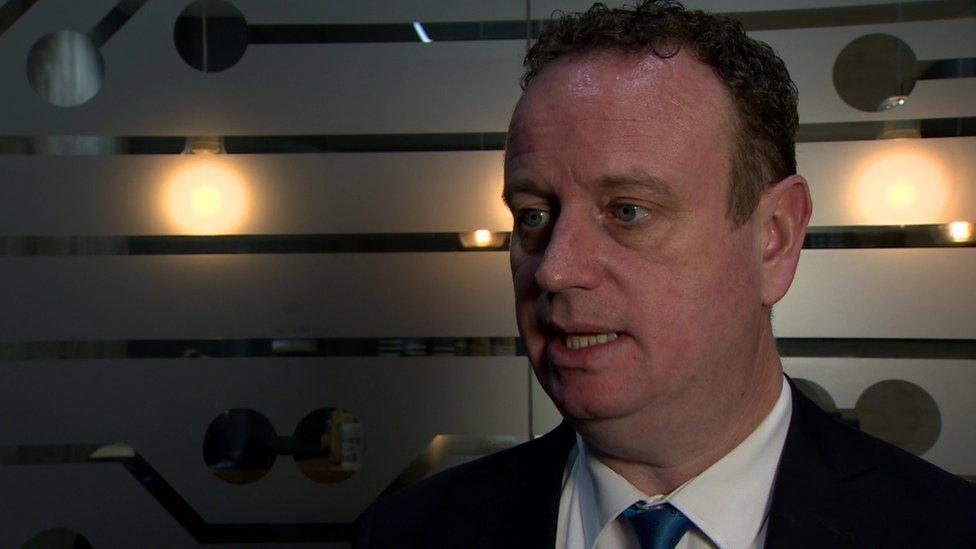
Stephen Kelly, chief executive of Manufacturing NI said business leaders were committed to ensuring a deal is "landed"
Mrs May also met business leaders during Tuesday's visit.
Stephen Kelly, chief executive of Manufacturing NI, said it had been a "very useful meeting".
"However, we are potentially 52 days out from Brexit so we need a deal and we need it now," he said.
Tina McKenzie, from the Federation of Small Businesses, said that while it was a "worrying time for business" in Northern Ireland there was no choice but to "stick with it".
"If we can get an agreement whereby Northern Ireland firms can trade unfettered that's the ideal scenario," she said.
She added that a positive from the meeting was that the PM "gave the commitment again that she wasn't interested be putting any sort of hard border in Ireland".
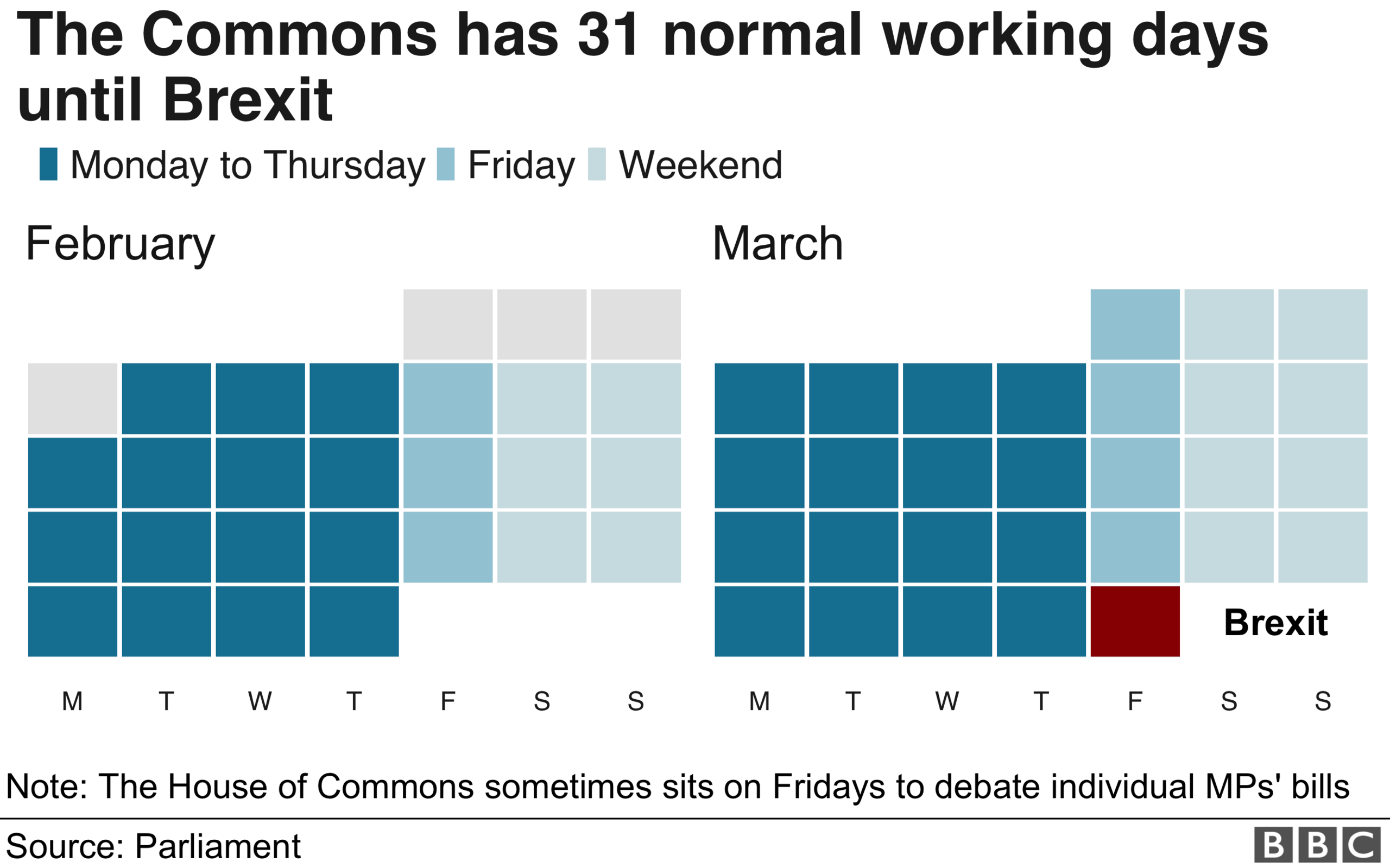
Where are we with the backstop?
In January, MPs overwhelmingly rejected the withdrawal deal that the government had negotiated with the EU, backing an amendment for the government to seek "alternative arrangements" to the backstop.
The prime minister addressed this and said although she has said technology could play a part in managing the Irish border, it needs to work for the "particular circumstances" of Northern Ireland.
Last July, Mrs May said no technology had been designed or implemented anywhere in the world yet to address the complexities of the Irish border.
European Union leaders have continued to rule out making changes to the withdrawal deal as agreed.
The EU's chief negotiator, Michel Barnier, said there was "full agreement" that the withdrawal agreement "cannot be reopened".
Confused by Brexit jargon? Reality Check unpacks the basics.

On Monday, German Chancellor Angela Merkel said the EU would listen to proposals to solve the Irish border "riddle", although they needed to hear how the UK wanted to do it.
Tánaiste (Irish deputy prime minister) Simon Coveney said: "What Ireland is being asked to do by some in Westminster is to essentially do away with an agreed solution between the UK government and EU negotiators and to replace it with wishful thinking," he said.
DUP Brexit spokesperson Sammy Wilson said his party would not support any legal "codicil" to the withdrawal deal.
Sinn Féin Brexit spokesperson Chris Hazzard said he did not think the prime minister had "any credibility at all".

Analysis: A speech designed to ease fears
By Jayne McCormack, BBC News NI political reporter
This was a speech light on specifics.
But it did feel like somewhat of an olive branch to those who feel frustrated by Theresa May's apparent U-turn on the backstop in recent weeks.
The audience heard an appeal from Mrs May to strengthen Anglo-Irish relations, her "unshakable" commitment to peace in NI and a hat-tip to business leaders who backed her original deal.
But the question of how the UK government intends to avoid a hard Irish border in its Brexit deal remains unanswered.

Meanwhile, Lord Trimble, a 1998 Nobel Peace prize-winner for his role in the Good Friday Agreement, said he was "exploring" the possibility of a legal challenge over claims the PM's Brexit deal breaches the historic peace agreement between the Republic of Ireland and Northern Ireland.
Mrs May's deal "turns the Belfast Agreement on its head and does serious damage to it", he told BBC Radio 4's Today programme.
What could the UK offer as possible backstop 'alternatives'?
A group of Leave and Remain MPs, the Alternative Arrangements Working Group, is in the middle of three days of talks aimed at finding other backstop options that would avoid a hard border.
Alternatives to the backstop that the prime minister wants to discuss with EU leaders include:
a "trusted trader" scheme to avoid physical checks on goods flowing through the border
"mutual recognition" of rules with the EU
"technological" solutions
However, the EU has maintained that it will not re-negotiate the withdrawal agreement, including the backstop.
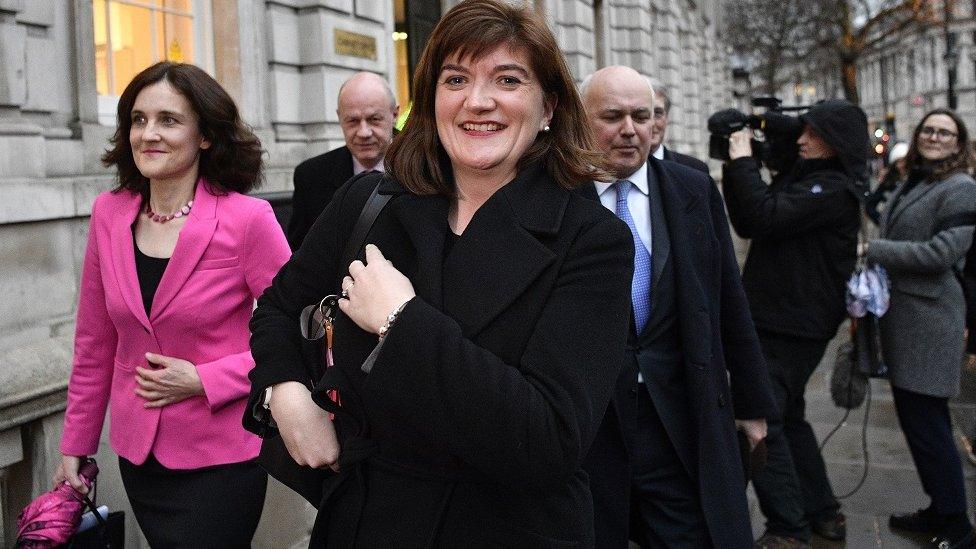
MPs heading into a second day of discussions on the Irish border backstop on Tuesday
What did the PM say about Stormont?
Northern Ireland has been without its executive since January 2017.
Mrs May said that had not helped with the Brexit deadlock. She is working to restore it.
She will meet Stormont's five main parties on Wednesday to discuss the political impasse.
- Published4 February 2019
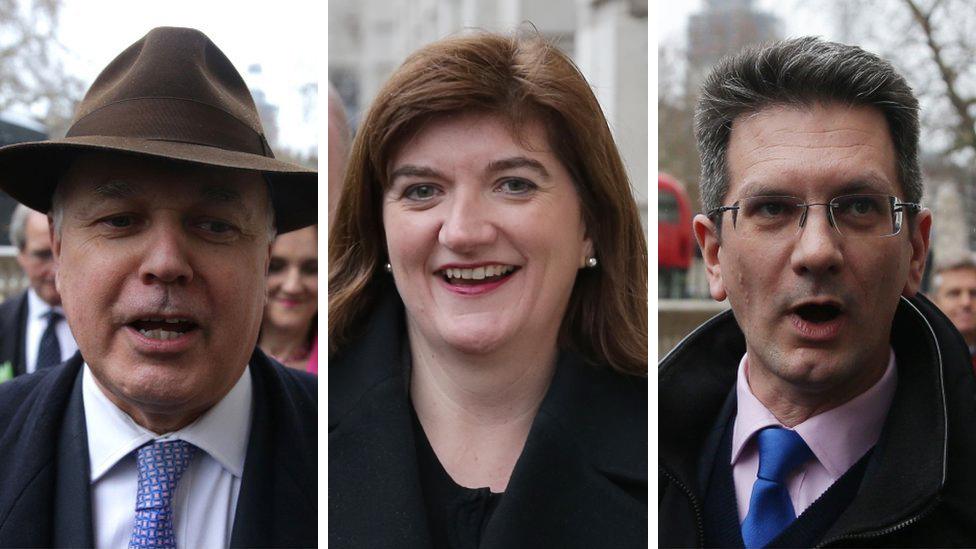
- Published4 February 2019
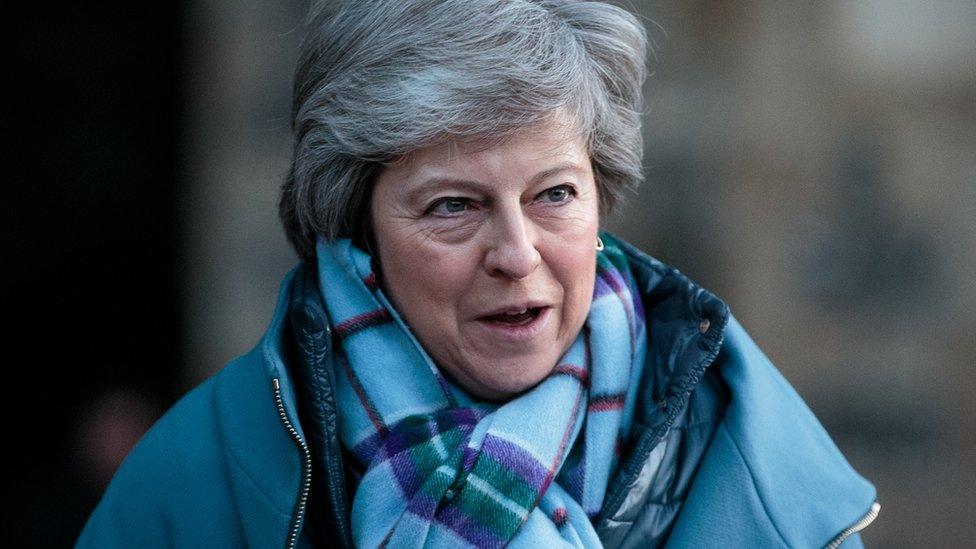
- Published16 October 2019
